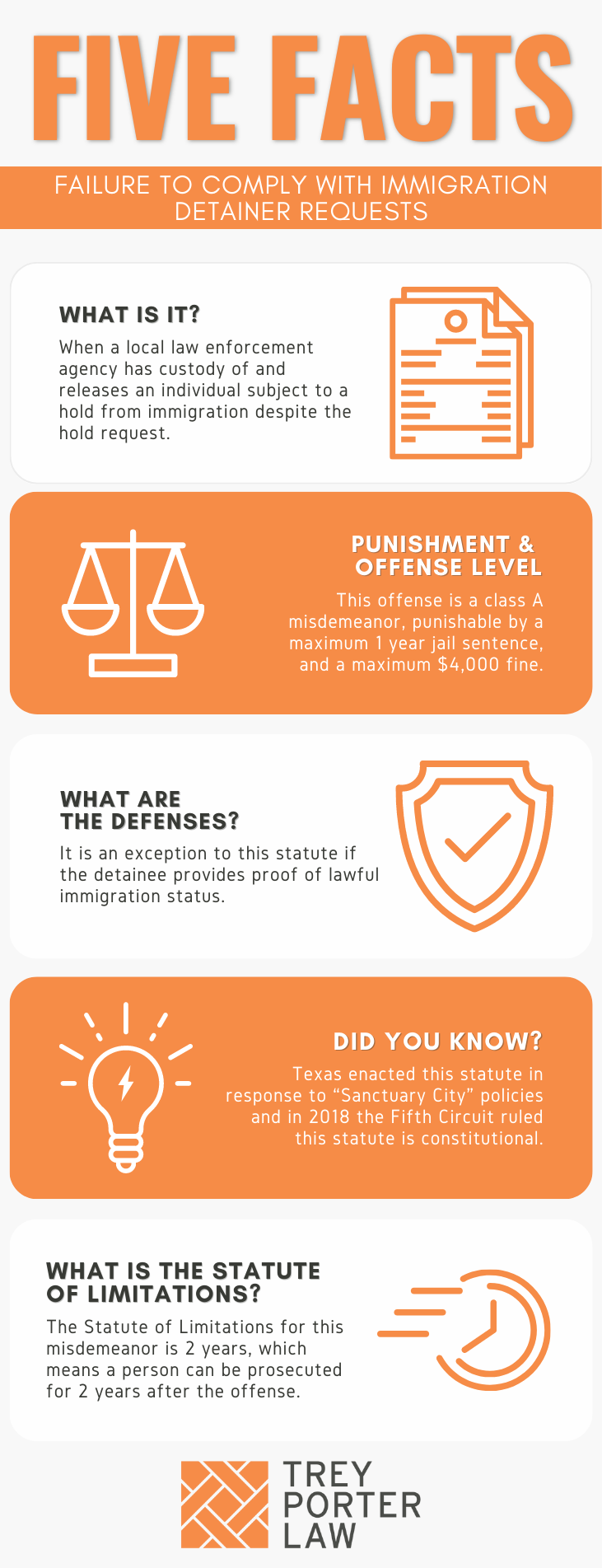WHAT IS FAILURE TO COMPLY WITH IMMIGRATION DETAINER REQUEST IN TEXAS?
The U.S. Immigration and Customs Enforcement agency (“ICE”) may issue an immigration detainer request, sometimes called an “ICE hold,” for suspected illegal aliens. ICE holds require local enforcement agencies to maintain custody of people who would otherwise be released, until the federal government can assume custody. If local officials knowingly release suspected illegal immigrants, they may be charged with the offense of failure to comply with immigration detainer request.

WHAT IS THE FAILURE TO COMPLY WITH IMMIGRATION DETAINER REQUEST LAW IN TEXAS?
Tex. Penal Code § 39.07. FAILING TO COMPLY WITH IMMIGRATION DETAINER REQUEST.
(a) A person who is a sheriff, chief of police, or constable or a person who otherwise has primary authority for administering a jail commits an offense if the person:
(1) has custody of a person subject to an immigration detainer request issued by United States Immigration and Customs Enforcement; and
(2) knowingly fails to comply with the detainer request.
(b) An offense under this section is a Class A misdemeanor.
(c) It is an exception to the application of this section that the person who was subject to an immigration detainer request described by Subsection (a)(1) had provided proof that the person is a citizen of the United States or that the person has lawful immigration status in the United States, such as a Texas driver’s license or similar government-issued identification.
WHAT IS THE PENALTY CLASS FOR FAILURE TO COMPLY WITH IMMIGRATION DETAINER REQUEST IN TEXAS?
Failure to comply with an immigration detainer request is a Class A misdemeanor, punishable by up to one year in county jail.
WHAT IS THE PUNISHMENT RANGE FOR FAILURE TO COMPLY WITH IMMIGRATION DETAINER REQUEST IN TEXAS?
Failure to comply with an immigration detainer request, a Class A misdemeanor, carries a possible punishment of up to one year in jail, and a maximum fine of $4,000.
WHAT ARE THE PENALTIES FOR FAILURE TO COMPLY WITH IMMIGRATION DETAINER REQUEST IN TEXAS?
A person charged with failing to comply with an immigration detainer request may be eligible for probation after a conviction, or deferred adjudication without a conviction, for a maximum period of two years.
WHAT ARE THE DEFENSES TO FAILURE TO COMPLY WITH IMMIGRATION DETAINER REQUEST IN TEXAS?
The law carves out an exception for failing to comply with an immigration detainer request, rather than a defense, if the detainee with an ICE hold provided proof of lawful immigration status.
- What is the difference between an exception and a defense? If a statute labels a provision an exception, the State must allege and prove beyond a reasonable doubt, in addition to the elements of the offense, that the exception does not apply. A defense, by contrast, must be raised by the accused, who also carries the evidentiary burden of proof.For the failure to comply with immigration detainer requests, the State must allege and prove beyond a reasonable doubt that the accused knowingly released a person who had an ICE hold, and the person did not show the accused proof of citizenship or other lawful immigration status.
WHAT IS THE STATUTE OF LIMITATIONS FOR FAILURE TO COMPLY WITH IMMIGRATION DETAINER REQUEST IN TEXAS?
The limitation period for the failure to comply with an immigration detainer request, a Class A misdemeanor, is two years.
FAILURE TO COMPLY WITH IMMIGRATION DETAINER REQUEST IN TEXAS
In response to “sanctuary city” policies of certain law enforcement agencies who refused to detain suspected illegal immigrants, the Texas Legislature enacted this law punishing such conduct.
TEXAS FAILURE TO COMPLY WITH IMMIGRATION DETAINER REQUEST COURT CASES
The case law regarding failure to comply with an immigration detainer request in Texas has shows the statute’s constitutionality being called into question.
In City of El Cenizo v. Texas, the Fifth Circuit upheld the constitutionality of the statutory scheme. Texas cities, counties, and local officials challenged the law forbidding sanctuary city policies throughout the state, arguing the law was unconstitutionally vague. The Fifth Circuit determined the law did not violate the Constitution on its face, and Texas could enforce it against cities openly refusing to comply with immigration detainer requests. 890 F.3d 164 (5th Cir. 2018).
















